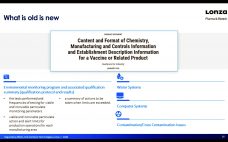Presented by: Dave Madge, vice president, research division, WuXi AppTec Madge described methods that his company applies to identify and evaluate bifunctional molecules that mediate targeted protein degradation (TPD). He pointed out that although much TPD research focuses on proteolysis targeting chimera (PROTAC) compounds, the tools used to identify such molecules also can be used to evaluate the therapeutic potential of other bifunctional molecules. Of particular interest are those that bring “housekeeping proteins” to disease-causing targets. More broadly, researchers are…
BPI Theater
BioProcess Insider Interview: Sam Machour, Samsung Biologics
BioProcess Insider brings the biotechnology news as it breaks. For the on-demand BPI Theater at the Biotechnology Innovation Organization’s 2021 convention, founding editor Dan Stanton interviewed leading biopharmaceutical executives in early June 2021. Contract development and manufacturing organizations (CDMOs) have thrived during the COVID-19 pandemic despite constraints on supply chains. Sam Machour, senior vice president and chief quality officer at Samsung Biologics explained that his company’s pandemic-period success has stemmed primarily from its ability to accelerate production timelines. Before 2020,…
BioProcess Insider Interview – Marc Hummersone, Astrea Bioseparations
BioProcess Insider brings the biotechnology news as it breaks. For the on-demand BPI Theater at the Biotechnology Innovation Organization’s 2021 convention, founding editor Dan Stanton interviewed leading biopharmaceutical executives in early June 2021. Highlighting the rapid proliferation of cell and gene therapies (CGTs), Hummerson described how his company seeks to support downstream processing for emerging therapies. Hummerson reflected that when he joined the biopharmaceutical industry in 2006, developers of monoclonal antibodies (MAbs) expressed great need for innovative purification solutions. The…
CGMP Manufacturing Facility Design and Evolution
Presented by: Mike Alston, Jr., director, project engineering; and William Leonardi, PhD, senior project manager, Avid Bioservices These two speakers shared lessons learned in the design and buildout of current good manufacturing practice (CGMP) manufacturing facilities at Avid. Leonardi began with a history of the company’s 28+ years of biologics development and manufacturing and its track record as a successful contract and development manufacturing organization (CDMO). Avid’s main campus comprises a cluster of buildings in Tustin, CA. GMP, process-development, and…
Manufacture of CRISPR RNPs for Clinical Use
Shawn Shafer, PhD, genome editing platform lead, Aldevron Shafer spoke about manufacturing ribonucleoproteins (RNPs) for clustered regularly interspaced short palindromic repeats (CRISPR) for clinical applications. CRISPR RNP consists of a guide RNA (sgRNA) complex with the CRISPR-associated protein 9 (Cas9). The Cas9 protein is complexed with the guide RNA as it associates with the genomic DNA. Once the guide RNA is aligned with the complementary genomic DNA sequence, the catalytic nucleus domains cleave the genomic DNA, creating a double-stranded break…
Technology Integrators in Cell and Gene Therapy: Powering Innovation
Julien Meissonnier, vice president and chief scientific officer, Catalent Meissonnier shared information about the expanded role of contract development and manufacturing organizations (CDMOs) in cell and gene therapies (CGTs). Catalent entered the gene therapy space in 2019 through acquisition of Paragon BioServices, adding expertise in adenoassociated viruses (AAVs) and viral vector manufacturing. Cell therapy capabilities were acquired early in 2020 through acquisition of MaSTherCell, with the goal of providing end-to-end integrated solutions to CGT customers. In addition to expertise in…
Development of an Advanced Gene Therapy Platform
Steve Pincus, PhD, head of science and innovation, Fujifilm Diosynth Biotechnologies Fujifilm Diosynth Biotechnologies (FDB) is a contract development manufacturing organization (CDMO) with four sites in the United Kingdom, Denmark, and the United States (Research Triangle Park, NC, and College Station, TX). The sites in Denmark, the United Kingdom, and North Carolina specialize in proteins and monoclonal antibodies (MAbs) with capabilities up to 20,000 L. The Texas site works primarily on virus-based therapies and was founded by Texas A&M University…
Meeting Regulatory Requirements for Cell and Gene Therapy Manufacturing
Karen Magers, head of regulatory affairs, cell and gene technologies; and Rajesh Thangapazham, head of regulatory strategy, cell and gene technologies, Lonza Pharma and Biotech Magers began with an overview of the complex regulations and guidance applicable to makers of cell and gene therapies. A slide illustrated the development timeline of such therapies and their associated regulations and guidance documents. That framework continues to evolve through revision of documents and guidelines as more information is gained about the technologies and…
Accelerating Clinical Development and Commericalization with a Lentiviral Vector Platform Manufacturing Process for Cell Therapy
Kevin Beck, senior manager, Miltenyi Biotec Beck’s presentation highlighted developments within Miltenyi subsidiary Lentigen Technology, a contract development and manufacturing organization (CDMO) that specializes in lentivirus (LV)-vectored cell therapy products. Lentigen’s original facility in Gaithersburg, MD, occupies 40,000 ft2 and features two ISO 7–compliant cleanrooms for lentivirus vector platform production, both of which comply with EU and US good manufacturing practice (GMP) guidelines. The company manufactures 80 lots/year but plans to boost manufacturing by launching a similarly equipped site in…
Stainless-Steel and Single-Use Systems: Observations from COVID-19
Justin Carbungco, associate director, small-scale commercial manufacturing, Samsung Biologics Carbungco began with what he described as a lingering question: Which is better, single use or stainless steel? He focused on cost comparisons for stainless-steel and single-use systems, including some factors for companies considering clinical and contract manufacturing. Implementation of single-use systems is estimated to grow to ~US$33 billion by 2027. The year-end growth rate as of 2020 will be about 10.85%. For biopharmaceutical manufacturers, most single-use systems are implemented at…










